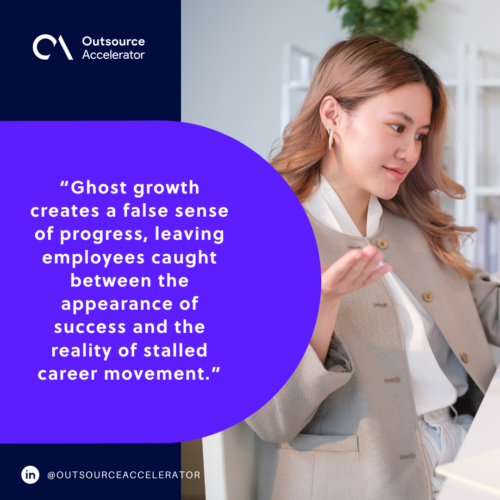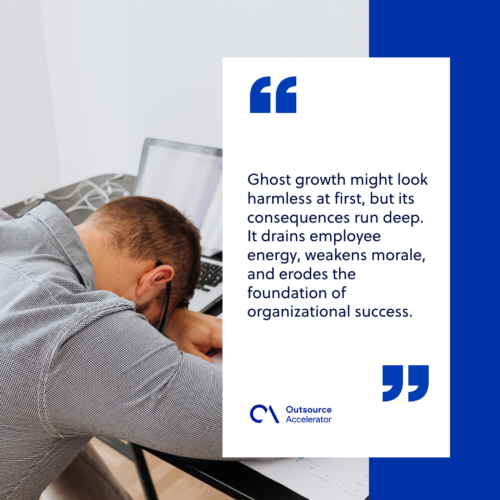Ghost growth: When progress on paper isn’t progress in reality

The workplace is always evolving, and it applies to any sector. New trends continually redefine how employees experience career advancement.
After the rise of quiet promotion, in which workers take on extra responsibilities without formal recognition, came job hogging, a phenomenon where employees cling to roles that limit internal mobility.
Now, a fresh trend is quietly spreading through offices: ghost growth. According to a recent MyPerfectResume survey of 1,000 U.S. professionals, 53% report experiencing this hidden form of career stagnation.
This article explores the reality behind ghost growth, why it’s becoming more common, and how it affects both employees and organizations striving for authentic progress.
What is ghost growth?
Ghost growth refers to the illusion of career advancement without a corresponding increase in pay, position, or authority.
Employees experience this when they take on additional responsibilities or projects that appear to signal professional growth, yet receive no meaningful recognition, promotion, or compensation in return.
It often occurs when organizations reward visible effort rather than tangible development or achievement. For example, a worker may lead new initiatives or train colleagues, believing these efforts will lead to advancement, only to remain in the same role.
Ghost growth creates a false sense of progress, leaving employees caught between the appearance of success and the reality of stalled career movement.

How does ghost growth affect employees and businesses?
Career progression often looks like packed schedules, endless meetings, and new responsibilities. Many employees believe that taking on more will move them closer to advancement.
Yet, as time passes, they realize that the promised growth never materializes. This silent trap creates the illusion of professional progress while leaving both employees and organizations struggling with hidden costs.
For employees, false promotion can lead to:
Burnout and emotional exhaustion
Ghost growth often prompts employees to take on heavier workloads without receiving fair recognition or reward. They put in extra hours, take on additional tasks, and strive to prove their worth, expecting that their effort will lead to advancement.
Instead, they face exhaustion as responsibilities expand while support remains limited. The constant demand drains energy and motivation, leading to emotional fatigue.
Over time, workers begin to associate hard work with stress rather than satisfaction. Chronic exhaustion reduces focus and creativity, making it harder to maintain consistent performance and enthusiasm for their roles.
Loss of motivation and engagement
As staff notice that increased effort does not translate into tangible career advancement, motivation begins to wane. Their initial excitement turns into frustration when promotions, raises, or recognition remain out of reach.
This lack of reward causes them to disengage, performing tasks out of obligation rather than passion. Team morale also declines because individuals see that performance no longer guarantees growth.
In such environments, even ambitious workers may stop pursuing new challenges, creating a workplace culture where minimal effort becomes the norm.
Career stagnation and skill decay
Ghost growth traps employees in repetitive tasks that appear important but do not foster the development of new skills or expand expertise. Instead of advancing their careers, they become stuck in roles that look progressive on paper but offer no real growth.
Over time, this stagnation limits their ability to compete in the job market or qualify for higher positions. Skills that once seemed valuable begin to lose relevance, making long-term career advancement more difficult.
The illusion of progress ultimately leads to professional decline rather than development.
On the other hand, here’s how ghost growth impacts businesses:
Decreased productivity and innovation
When employees lose motivation and energy, overall productivity drops. Disengaged workers tend to focus only on immediate tasks, rather than exploring new ideas or improving processes.
The absence of innovation stalls the company’s progress and weakens its competitive edge. A workforce trapped in ghost growth becomes reactive rather than proactive, reducing the organization’s ability to adapt to change or seize new opportunities.
High turnover and recruitment costs
Talented employees eventually leave organizations that fail to recognize their contributions. High turnover creates a cycle of constant hiring and training, which drains financial and managerial resources.
Replacing experienced staff also disrupts workflow and lowers team cohesion. Businesses then struggle to maintain consistency and quality in their operations, affecting both internal stability and customer satisfaction.
Damaged reputation and employee trust
Organizations that allow ghost growth to persist risk losing credibility among current and prospective employees. Workers talk, and word spreads quickly about environments where advancement is only an illusion.
This damages the company’s reputation as a desirable place to work, making it harder to attract skilled candidates. Internally, employees begin to distrust leadership, feeling that promises of growth are empty.
Once trust is broken, rebuilding loyalty and commitment is a long, costly process.
Ghost growth might look harmless at first, but its consequences run deep. It drains employee energy, weakens morale, and erodes the foundation of organizational success.
For both individuals and businesses, true progress must go beyond appearances, as it must reflect genuine growth, recognition, and meaningful advancement.

3 ways to prevent ghost growth
Preventing ghost growth requires a clear focus on meaningful development instead of superficial success.
1. Set transparent growth criteria
Employees need to understand what progress truly looks like within the organization. Managers should define measurable milestones for promotions, raises, and skill advancement.
When workers see a direct connection between performance and recognition, they can focus their efforts on productive outcomes rather than empty tasks. Transparent standards create accountability and motivate employees to pursue authentic growth.
2. Promote skill development and learning
Career advancement depends on continuous improvement. Companies should invest in training programs, mentorship, and upskilling opportunities that strengthen employee expertise.
Encouraging workers to learn new technologies, leadership techniques, or industry trends helps them expand their value and confidence. Real development happens when employees gain skills that prepare them for higher roles instead of repeating familiar tasks.
3. Recognize and reward meaningful progress
Acknowledging genuine contributions keeps employees motivated and engaged. Managers should highlight achievements that drive measurable results, not just visible effort.
Regular feedback sessions and performance reviews help align goals and show that growth is both noticed and valued. When recognition matches contribution, employees feel seen and inspired to continue improving.
Preventing ghost growth requires intention, transparency, and consistent support. Learn how to turn apparent progress into genuine professional advancement.
Ghost growth: Essential FAQs
Ghost growth raises questions many employees are afraid to ask, so here are key FAQs that clarify this hidden workplace issue.
Is ghost growth more common in fast-growing companies?
Yes. Rapidly expanding companies often rely on employees to absorb extra work quickly, which can create the illusion of advancement without real promotion when structures and processes fail to keep up.
Can ghost growth happen to new employees?
It can. New hires may take on additional tasks to prove themselves, but without clear expectations or role definitions, early responsibilities may appear to be a form of growth while offering no real progress.
Does remote work make ghost growth harder to detect?
Remote work can conceal ghost growth because managers may interpret increased activity as a sign of development. Without visible role changes, employees may quietly shoulder more responsibilities without being noticed.
How can employees tell if they’re experiencing ghost growth?
Warning signs include expanded duties without pay changes, unclear advancement timelines, repeated promises with no action, and taking on projects that don’t align with defined career goals.
Is ghost growth always intentional on the company’s part?
Not always. It often results from unclear processes, fast workloads, or poor communication. Still, unintentional ghost growth can harm morale and progress if leaders fail to address it promptly.







 Independent
Independent




